Scripture and homily in brief for the Thursday occurrence of All Corners Day, the Ultimate Thursday of the Piety dozenal of All Hallows season.
Isaiah 28:9-13
9 Whom shall he teach knowledge? and whom shall he make to understand doctrine, those just weaned from milk, and drawn from the breast?
10 For rule must be upon rule, measure upon measure; blah blah, yada yada, bit by bit:
11 Very well then, with foreign lips and strange tongues will he speak to this people.
12 To whom he said, “This is rest, let the weary rest with it; and this is refreshment” yet they would not hear.
13 But the word of Yahweh shall be unto them rule upon rule, measure upon measure, bit by bit; that they might go, and fall backward, and be broken, and snared, and taken.
First Letter to the Corinthians 14
2 Those who speak in a tongue do not speak to other people but to God; for nobody hears them, since they are speaking mysteries in the Spirit.
3 On the other hand, those who prophesy speak to other people for their enrichment and encouragement and consolation.
4 Those who speak in a language build up themselves, but those who prophesy build up the church.
5 Now I would like all of you to speak in languages, but even more to prophesy. One who prophesies is greater than one who speaks in languages, unless someone interprets, so that the church may be built up.
6 Now, brothers and sisters, if I come to you speaking in languages, how will I benefit you unless I speak to you in some revelation or knowledge or prophecy or teaching?
18 I thank God that I speak in tongues more than all of you;
19 nevertheless, in church I would rather speak five words within my understanding, in order to instruct others also, than ten thousand words in an unknown language.
20 Brothers and sisters, do not be children in your thinking; rather, be infants in [regard to] evil, but in thinking be adults.
21 In the law it is written, “By people of strange tongues and by the lips of foreigners I will speak to this people; yet even then they will not listen to me,” says the Lord.
22 Tongues, then, are a sign not for believers but for unbelievers, while prophecy is not for unbelievers but for believers.
23 If, therefore, the whole church comes together and all speak in tongues, and outsiders or unbelievers enter, will they not say that you are out of your mind?
24 But if all prophesy, an unbeliever or outsider who enters is reproved by all and called to account by all.
25 After the secrets of the unbeliever’s heart are disclosed, that person will bow down before God and worship him, declaring, “God is really among you.”
Homily: Speaking in Tongue and the Value of Others
In the spirit of All Corners Day, today’s lesson is ultimately about how religious truth transcends national, linguistic, cultural, and even sectarian boundaries. Unitarian Reform celebrates All Corners Day in honor of those called the “Pious Outsiders,” virtuous persons of other nations and faith traditions.
But, given our readings from scripture, it is important to address the issue of “speaking in tongues,” an emblem of the universality of truth that spans the history of our religion from the Prophets of Judaism through the Fathers of the Christian Church. It is a poorly understood Christian idiom that is often corrupted to mean babbling incoherently in a meaningless trance state barely distinguishable from a drug trip.
Despite folk myths about speaking in tongues, in the early days of the Church it did not refer to what we now call glossolalia1, ecstatic chattering, but xenoglossia, the miraculous ability to communicate in a language you have not learned through normal means. Glossolalia, as it is practiced by certain sects, is believed to demonstrate something admirable about the individual who has fallen into a psycho-social ecstasy: that he or she has been touched by the Holy Spirit. Xenoglossia, as understood in its proper Christian context, symbolizes something admirable about the teachings of Jesus Christ: that they can be communicated in all languages and understood by all nations.
The real point of this central Christian image is not to prove an individual has scored spiritual points, but to show that truth transcends the bounds of tongue and culture.
By the time of Paul, pagan recruits to Christianity had already begun corrupting the idea of “tongues” to selfish purposes; as his First Letter to the Corinthians shows, poorly supervised converts were misapplying the message of the Pentecost miracle in a way that communicated nothing and only served to glorify the self [see 14:2-4]. The original meaning of xenoglossic translation of wisdom for the benefit of unbelievers had become corrupted in the child’s play mimicry of glossolalia for self-aggrandizement among (supposed) believers [see 14:22]. In a typically conservative Pauline fashion, the Apostle simply discourages the idea altogether rather than expounding on the nuances of the Corinthians’ error, and this has contributed considerably to confusion about the concept.
However, it is clear from the writing of other early church leaders that “speaking in tongues” meant miraculous multilingualism:
In chapter 16 of the Gospel of Mark, written around 70 CE, among the signs of “those who have believed” is that “they will speak in new languages.” Glossolalists often claim that the tongues they are speaking represent a supposed language of Heaven or of angels, which would not be a “new” language at all. The obvious meaning of “new languages” in Mark is that the languages are new to the speaker.
In the Acts of the Apostles, also written in the 1st Century, when the prophecy in Mark comes to pass it is described like this: “All of them were filled with the Holy Spirit, and began to speak in other languages, as the Spirit gave them utterance.”
In the 2nd Century, Irenaeus wrote that “in like manner we do also hear many brethren in the Church, who possess prophetic gifts, and who through the Spirit speak all kinds of languages, and bring to light for the general benefit the hidden things of men, and declare the mysteries of God.”
During the conflationist controversies of the 4th Century, even an apostate like Hilary of Poitiers described tongues as “gifts of either speaking or interpreting divers kinds of languages.”
Also in the 4th Century, Eusebius of Caesaria (not St. Eusebius of Nicomedia) specifically speaks against glossolalia, accusing the heretic Montanus that “he became possessed of a spirit, and suddenly began to rave in a kind of ecstatic trance, and to babble in a jargon, prophesying in a manner contrary to the custom of the Church which had been handed down by tradition from the earliest times.” [emphasis added]
Augustine of Hippo, who survived into the 5th century, clearly defined the meaning of speaking in tongues as xenoglossia, stating that those who did so spoke in languages “which they had not learned.”
The miracle of the Pentecost was clearly xenoglossia, and its spiritual meaning that God’s truth knows no language, no culture, no boundary of the human mind. And that is the spirit of All Corners, when we open our hearts to the good in those who speak other languages, salute other flags, and worship using other words.
Go with God, in the impartial love of agape and the universal power of the Logos.
1 Unfortunately, the term glossolalia, which is derived from biblical Greek, has come to refer almost exclusively to the phenomenon of babbling incoherently in a mistaken demonstration of inspiration by the Holy Spirit. Despite our objection to this unscriptural use of the scriptural term, we use it here in that context to assist in distinguishing this false interpretation of “speaking in tongues” from its proper, xenoglossic, meaning.
_
Discussion: Read again the scriptures for today. Note that in both cases, a contrast is made between what is proper and what is childish. Now, as in the Gospel, Paul recognizes the value of child-like innocence to evil, but he correctly identifies as childish the misuse of tongues as a selfish means of spiritual bragging. Likewise Isaiah scolds his listeners for acting like children who merit only rule-based moral teaching rather than wisdom. How does Paul’s response to the abuse of “tongues” echo the reproof of Isaiah?
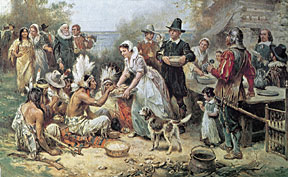 Thanksgiving is often recognized as an inter-cultural holiday, celebrating the cooperation of European Pilgrims and Native Americans, but it is also an interfaith holiday. After all the Wampanoag were not Christian.
Thanksgiving is often recognized as an inter-cultural holiday, celebrating the cooperation of European Pilgrims and Native Americans, but it is also an interfaith holiday. After all the Wampanoag were not Christian.
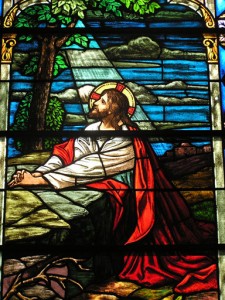
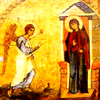
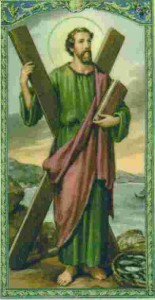 Andrew is not the most well-known Apostle. However, he was the first disciple of Jesus Christ.
Andrew is not the most well-known Apostle. However, he was the first disciple of Jesus Christ. On
On 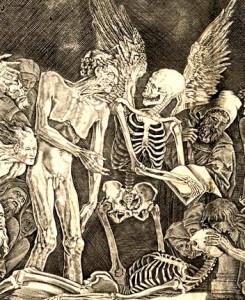 The opening of the liturgical year evokes a key theme of genuine Christianity: facing fear and death on the path to revelation and redemption. In the lead-up to the secularized holiday of Halloween, the Eve of All Hallows Day, we join the playful celebration of spookiness as a way of easing into the hard lessons of salvation through suffering.
The opening of the liturgical year evokes a key theme of genuine Christianity: facing fear and death on the path to revelation and redemption. In the lead-up to the secularized holiday of Halloween, the Eve of All Hallows Day, we join the playful celebration of spookiness as a way of easing into the hard lessons of salvation through suffering.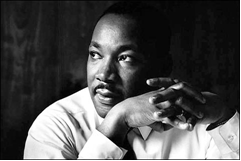 It is quite appropriate that the birthday of Martin Luther King Jr. falls on the
It is quite appropriate that the birthday of Martin Luther King Jr. falls on the